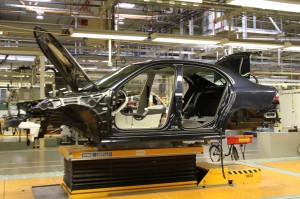Struggling to head off a collapse, the cash-strapped Swedish carmaker Saab has lined up a pair of deals that could allow it to reopen its headquarters assembly plant later this week.
Saab’s Dutch parent company, Spyker Cars NV, plans to borrow 30 million Euros ($44.6 million) from the Gemini Investment Fund, money that apparently will be used to pay off suppliers who have been boycotting the Swedish maker for nearly a month.
“We’re hoping to restart production in the next week, however it’s dependent upon our conversation with suppliers and parts availability,” cautioned Saab’s U.S. spokeswoman Michele Tinson.
While the Gemini deal could head off a near-term catastrophe, the longer-term news involves the aspiring Chinese automaker Hawtai Automotive Group, which plans to announce a new partnership with Saab on Tuesday during a Beijing news conference.
Sources tell TheDetroitBureau.com that Vladimir Antonov, the wealthy Russian businessman who had hoped to pull off a deal of his own with Saab may yet align himself with the struggling maker as part of the latest developments.
“I would like to apologize to our dedicated employees, suppliers, dealers and customers for the disruptions of the past weeks,” Victor Muller, Chairman of Saab and CEO of Spyker Cars, said on Monday. “We will do everything in our power to restore the confidence in our company as soon as practically possible.”
Spyker acquired Saab in early 2010 after drawn-out negotiations with General Motors. But by the time the deal was completed, GM had closed Saab’s main plant, in Trollhattan, Sweden, which took seven weeks to resume operations. In term, Saab officials claim, that sharply impacted sales, creating a cash crunch that has continued into 2011.
Nearly a month ago, several key suppliers refused to deliver parts to the plant until they were paid. In an interview with TheDetroitBureau.com during the New York Auto Show, Muller admits he tried to “call their bluff,” a move that backfired leading to the boycott that has so far cost nearly 4,000 units of lost production. The plant produces both the flagship Saab 9-5 as well as the smaller, higher-volume 9-3.
In a desperate bid to raise cash, Saab unsuccessfully tried to loosen up access to a loan provided in 2010 by the European Investment Bank – but only for use in product development and related programs. The maker then turned to Antonov, a one-time partner in Spyker. The Russian offered to buy up the Saab plant and other asserts and then lease them back to the Swedish maker.
That proposal requires the approval of the EIB, however, and the bank has so far declined to give its approval despite the support of the Swedish government – which underwrote the bank loan.
Last week, Muller said that he would find other means to prop up his company, and hinted that he was negotiating with one of three possible Chinese partners. Those initially reported to be in discussions included Great Wall Motor Co., China Youngman Automobile Group Co. and Jiangsu Yueda Group Co. So the tie-up with Hawtai comes as a surprise to observers.
Precisely what sort of alliance is in store isn’t being disclosed before the Tuesday announcement, which will come mi-Tuesday afternoon Beijing time. Hawtai is a relatively small maker, with production reportedly under 100,000 units in 2010. It is one of perhaps 100 different Chinese makers that, as TheDetroitBureau.com today reports, is hoping to survive the anticipated shake-out of the crowded market. (For that story, Click Here.)
Muller is expected to participate in the news conference, as is Hawtai Vice President Richard Zhang. There is no mention of Antonov, though he may yet expand his role. Antonov was forced out at Spyker in late 2010 when GM said it would not negotiate the sale of Saab if the Russian were involved in the deal. Last week, however, the U.S. maker said it would accept Antonov’s return. GM still has extensive ties to Saab, among other things producing the new Saab 9-4X crossover vehicle at a plant in Mexico.
The loan from Gemini Investment matures in six months and is convertible into stock at a price of 4.88 Euros a share.
Ironically, Saab will draw down 29.1 million Euros from the original EIB loan next week. But that money cannot be used for day-to-day operations. That draw-down will leave about 154 million Euros of the original 400 million Euro EIB loan for future use on product development and related efforts.
Coincidentally, the other Swedish automaker, Volvo Cars, was sold outright to the Chinese car company, Geely, in 2010.

